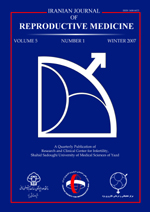
|
International Journal of Reproductive BioMedicine
Research and Clinical Center for Infertility, Shahid Sadoughi University of Medical Sciences of Yazd
ISSN: 1680-6433
EISSN: 1680-6433
Vol. 17, No. 8, 2019, pp. 543-550
|
 Bioline Code: rm19058
Bioline Code: rm19058
Full paper language: English
Document type: Research Article
Document available free of charge
|
|
|
International Journal of Reproductive BioMedicine, Vol. 17, No. 8, 2019, pp. 543-550
| en |
Knowledge and attitude toward genetic diseases and genetic tests among pre-marriage individuals: A cross-sectional study in northern Iran
Hashemi-Soteh, Mohammad Bagher; Nejad, Ali Vali; Ataei, Golamreza; Tafazoli, Alireza; Ghasemi, Dariush & Siamy, Rita
Abstract
Background: Genetic testing has been widely introduced for many hereditary
disorders. While the attitudes towards these facilities have been evaluated in many
countries, there are only a few reports on the knowledge of and the orientation among
Iranians.
Objective: The current study assesses the attitudes and knowledge of pre-marriage
individuals toward the availability and use of genetic tests.
Materials and Methods: A comprehensive questionnaire was distributed among 408
marrying individuals. The questions addressed the demographic characteristics along
the registration of participant’s knowledge, education, and attitude toward genetic
testing. The individuals were divided into three groups based on their knowledge: 1)
Scored above 80 to 100 were defined as “good” 2) 60 to 80 as “average” 3) less than
60 as “poor” knowledge.
Result: Most participants (86%) believed consanguineous marriages increase the
risk of genetic diseases; 82.3% knew that thalassemia is a type of genetic disease,
only 33.3% could distinguish prenatal diagnosis (PND) from other laboratory tests.
The relationship between the participants’ knowledge and their level of education
was significant (r = 0.78, p < 0.001), age (r =0.16, p < 0.01), and urbanity (p < 0.01). A
prominent relationship was observed between the knowledge (r = 0.64, p < 0.001) or
education (r = 0.62, p < 0.001) and people’s desire to use the genetic tests before the
wedding ceremony. No significant correlations were found between the participant’s
attitude and their ages/urbanity. Most of the individuals agreed to arrange a genetic
counseling before marriage (0.94%).
Conclusion: This study revealed that most individuals were interested in using genetic
counseling services and genetic tests before marriage.
Keywords
Attitude; Knowledge; Genetic testing; Genetic counseling; Prenataldiagnosis.
|
| |
© Copyright 2019 - Mohammad Bagher Hashemi-Soteh et al.
Alternative site location: http://www.ijrm.ir
|
|
